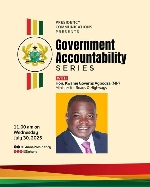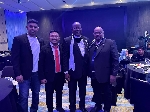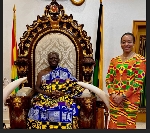Kwaku Azar spits on Freddie Blay's ‘bosom theory’
 Freddie Blay
Freddie Blay
Legal scholar and constitutional activist Prof. Stephen Kwaku Asare, popularly known as Kwaku Azar, has sharply criticised recent comments by a former NPP chairman, Freddie Blay, suggesting that presidential term limits are open to judicial interpretation.
The controversial claim, grounded in what has been dubbed the “bosom theory” — the idea that the law resides in the discretion of judges — has sparked widespread alarm among legal minds and democracy advocates.
In a strongly worded statement, Kwaku Azar warned that such reasoning is not only “disappointing” but “dangerous”, arguing that it undermines constitutional certainty and opens the door to authoritarianism under the guise of judicial interpretation.
The former political leader, who also previously served in the Convention People's Party (CPP), reportedly claimed in an interview that term limits could be viewed as “elastic,” adding that “the law is in the bosom of the judge.” The remarks have ignited debate across legal, political, and academic circles.
Kwaku Azar responded with a scathing critique, asserting that judges are not the authors of the Constitution but its interpreters, and that the bosom theory—if left unchallenged—could destroy public trust in the judiciary.
“To flirt with the notion that two terms may not mean two terms is to normalise judicial pliancy—and to flirt with constitutional revisionism disguised as interpretation.
It is a concert masquerading as constitutional law,” he stated.
As part of his rebuttal, Kwaku Azar released “GOGO’s Top 10 Reasons to Reject the Bosom Theory,” outlining the constitutional, legal, and democratic dangers it poses:
It Undermines Legal Certainty – If “two terms” becomes debatable, laws lose their clarity and consistency.
It Weakens Judicial Legitimacy – Judges should apply the law, not invent it based on personal disposition.
It Enables Authoritarian Creep – Vague interpretations of term limits allow leaders to overstay their mandate.
It Encourages Strategic Litigation – Court outcomes become more about who’s on the panel than what the law says.
It Corrupts Judicial Appointments – Politicians may appoint judges who align with their personal or political interests.
It Makes the Constitution a Suggestion, Not a Standard – Bosom theory turns legal text into subjective improvisation.
It Fuels Panel Rigging – Assignments are no longer random but curated to favour certain outcomes.
It Demotes Parliament and Elevates Panels – Judges, not lawmakers, become the de facto arbiters of national law.
It Destroys Equality Before the Law – Judicial outcomes become unequal, favouring the powerful and well-connected.
It Sabotages Democracy from Within – Democracies may erode through “interpretation,” not coups.
Kwaku Azar’s statement has resonated with many concerned about the creeping politicisation of the judiciary and the integrity of Ghana’s constitutional democracy, especially with elections approaching.
Source: Classfmonline.com/Cecil Mensah
Trending News

Roads Minister unveils Mahama’s road agenda at Gov't Accountability Series
09:09
Young Executive CEO honoured with two International awards at Champions of Asia 2025 in Malaysia
15:16
Deputy Transport Minister-Designate proposes Jomoro-Tema railway link
17:30
UNICEF applauds Ghana for fulfilling its 2025 vaccine co-financing to curb children's vaccine shortage
10:49
Parliament passes Mahama Care Bill to expand access to patients suffering NCDs
01:37
MoH pays salaries of 321 pharmacist interns, assures rotation nurses and allied health interns of imminent payment
08:44
Attorney-General emphasises asset recovery over prolonged trial in Unibank case
12:47
GTEC vows to prosecute holders of 'fake' doctorate degrees
16:58
Zanetor Agyeman-Rawlings pays courtesy call on Otumfuo Osei Tutu II
10:30
Gov't Accountability Series features Lands Minister Emmanuel Armah Kofi-Buah today
01:12




